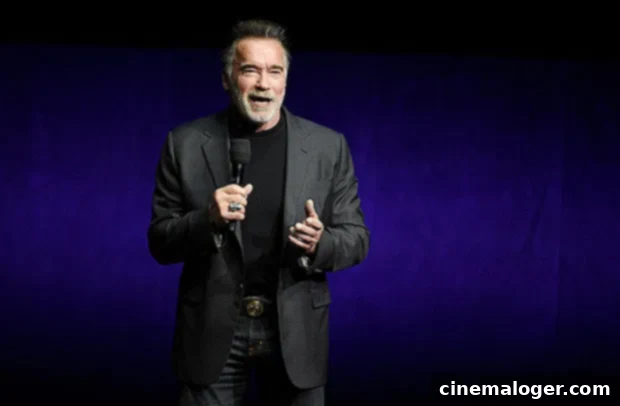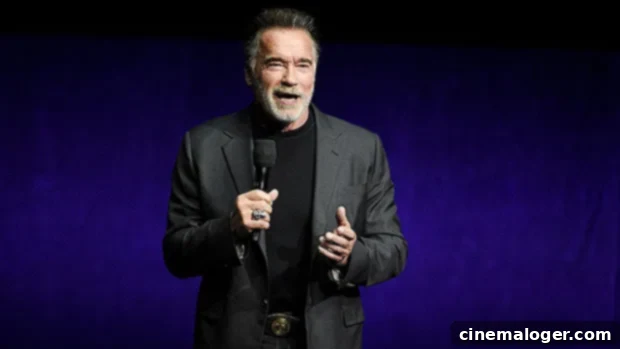Arnold Schwarzenegger’s Dire Warning: Comparing Capitol Riot to Nazi Germany’s Rise
In a powerful and poignant message that resonated across the globe, actor and former Governor of California, Arnold Schwarzenegger, issued a stark warning to Americans, drawing unsettling parallels between the January 6th, 2021, pro-Trump riot on Capitol Hill and the dark origins of Nazi Germany in the 1930s. His eight-minute video, released on January 10th, 2021, quickly went viral, igniting widespread discussion about the fragility of democracy and the insidious nature of political extremism.
Schwarzenegger did not mince words as he lambasted then-President Donald Trump, unequivocally declaring him the “worst president ever.” However, the most chilling aspect of his address was the historical context he provided, rooted in his own childhood experiences in post-World War II Austria. He recounted growing up amidst the lingering devastation and moral decay left by World War II, a period shaped by the atrocities committed under Nazi rule. This personal connection lent immense weight to his comparison of the Capitol siege to Kristallnacht, or “the Night of Broken Glass.”
Kristallnacht, a horrific pogrom against Jews carried out by Nazi paramilitary forces and civilians in 1938, involved the systematic destruction of Jewish homes, businesses, and synagogues. Schwarzenegger vividly described it as “a night of rampage against the Jews carried out in 1938 by the Nazi equivalent of the Proud Boys.” His direct comparison of the Trump supporters who stormed the Capitol to these historical perpetrators of violence was a deliberate and unsettling choice, designed to underscore the severity of the attack on American democratic institutions.
“Wednesday was the Day of Broken Glass right here in the United States,” Schwarzenegger stated with gravitas. He continued, explaining that the mob’s actions went far beyond mere physical damage. “But the mob did not just shatter the windows of the Capitol. They shattered the ideas we took for granted … [and] trampled the very principles on which our country was founded.” This statement highlights the deeper, symbolic damage inflicted on the core tenets of American democracy, including the peaceful transfer of power, respect for the rule of law, and the sanctity of electoral processes.
My message to my fellow Americans and friends around the world following this week’s attack on the Capitol. pic.twitter.com/blOy35LWJ5
— Arnold (@Schwarzenegger) January 10, 2021
Schwarzenegger’s Unflinching Criticism of Leadership and Patriotism
The 73-year-old former bodybuilder did not shy away from putting the blame squarely on the then-President, urging Americans to be acutely “aware of the dire consequences of selfishness and cynicism.” He asserted that Trump “sought a coup by misleading people with lies,” directly accusing him of attempting to subvert the democratic process through deception and incitement. Schwarzenegger’s message served as a powerful reminder of the responsibilities that come with leadership and the dangers of those who abuse their power.
His condemnation of Trump as a “failed leader” who “will go down in history as the worst president ever” was delivered with a sense of finality. In a particularly memorable quip, Schwarzenegger predicted Trump’s future irrelevance, stating, “The good thing is he will soon be as irrelevant as an old tweet.” This witty but biting remark underscored the ephemeral nature of political power when it is not wielded with integrity and respect for democratic norms.
Beyond Trump himself, Schwarzenegger also extended his criticism to members of the Republican party who continued to support the former President’s baseless claims of election fraud. To emphasize his point, he invoked the words of President Theodore Roosevelt: “Patriotism means to stand by the country. It does not mean to stand by the president.” This quote served as a powerful call to action for elected officials, urging them to prioritize their constitutional duties and loyalty to the nation over partisan allegiance or personal loyalty to any single individual.

A Call for Unity and the Future of American Democracy
In the latter part of his lengthy address, Arnold Schwarzenegger pivoted from condemnation to a message of hope and optimism for the future. He congratulated President-elect Joe Biden on his “free and fair” election victory, underscoring the legitimacy of the democratic process despite attempts to undermine it. He extended his best wishes to Biden as he prepared to take office later that month, signaling a belief in the resilience of American institutions and the importance of a peaceful transition of power.
Schwarzenegger’s powerful statement was not an isolated incident. The Capitol riots elicited widespread condemnation from numerous high-profile figures across the political spectrum and public life. Among those who spoke out forcefully was former First Lady Michelle Obama, who issued a passionate statement strongly criticizing Donald Trump. She described the president’s actions as “infantile and unpatriotic,” reflecting a common sentiment that the leader of the free world had failed to uphold the dignity and responsibilities of his office. Obama further elaborated that Trump “can’t handle the truth of his own failures,” highlighting the danger of leaders who refuse to acknowledge reality and accept the outcomes of democratic processes.
The Echoes of History: Understanding the Gravity of Schwarzenegger’s Comparison
The deliberate comparison of the Capitol riot to the rise of Nazi Germany and Kristallnacht is profound and merits close examination. Schwarzenegger, having grown up in the shadow of such events, understands the subtle yet perilous steps that can lead a society down a dangerous path. His warning serves as a reminder that the erosion of democratic norms does not always begin with overt tyranny but can start with the normalization of lies, the demonization of political opponents, and the incitement of violence against institutions. The “Day of Broken Glass” at the Capitol, in his view, was not merely a protest gone awry, but a significant crack in the foundation of American democracy, mirroring the early fissures that historically preceded much larger collapses.
His message transcends partisan politics, appealing to a fundamental commitment to democratic principles that should unite all Americans. By invoking the memory of his own history, Schwarzenegger aimed to jolt his audience into recognizing the gravity of the situation, urging them to learn from the past to protect the future. The historical parallels, though strong, were intended to be a preventative alarm, not a declaration of an inevitable outcome, emphasizing that the course of history can be altered through vigilance and collective action.
Upholding American Principles: A Call for Vigilance and Accountability
The “ideas we took for granted” and the “principles on which our country was founded” that Schwarzenegger referred to are the bedrock of the American experiment: freedom of speech, the right to vote, the rule of law, the peaceful transfer of power, and respect for minority rights. The events of January 6th, and the rhetoric leading up to them, challenged these principles in unprecedented ways. Schwarzenegger’s call to awareness is a plea for citizens to actively engage in safeguarding these values, to demand accountability from their leaders, and to reject narratives that seek to undermine truth and sow division.
His message underscores that democracy is not a spectator sport; it requires active participation and defense. It necessitates a commitment to facts over falsehoods, dialogue over division, and the common good over individual ambition. The former governor’s words serve as a potent reminder that the strength of a nation lies not just in its military or economy, but in the unwavering commitment of its people to its founding ideals.
Schwarzenegger’s Unique Perspective and Enduring Impact
Arnold Schwarzenegger’s background provides a unique and powerful lens through which to view these events. An immigrant who achieved the American Dream, rising from humble beginnings in Austria to global stardom and the governorship of California, he has a profound appreciation for the freedoms and opportunities afforded by a democratic society. His personal connection to a country that endured the horrors of fascism gives him a distinct moral authority when speaking on the dangers of extremism. His message, therefore, carries a weight that transcends his celebrity status, resonating as a heartfelt plea from someone who has witnessed firsthand the fragility of peace and democracy.
His ability to articulate complex historical parallels in simple, direct language made his message accessible and impactful to a broad audience. It served as a vital wake-up call, urging Americans to reflect on the meaning of patriotism, the responsibilities of leadership, and the enduring importance of protecting democratic institutions. Schwarzenegger’s intervention contributed significantly to the national conversation about the Capitol riot, pushing for a deeper understanding of its historical implications and the critical need for national unity and a renewed commitment to democratic principles.
